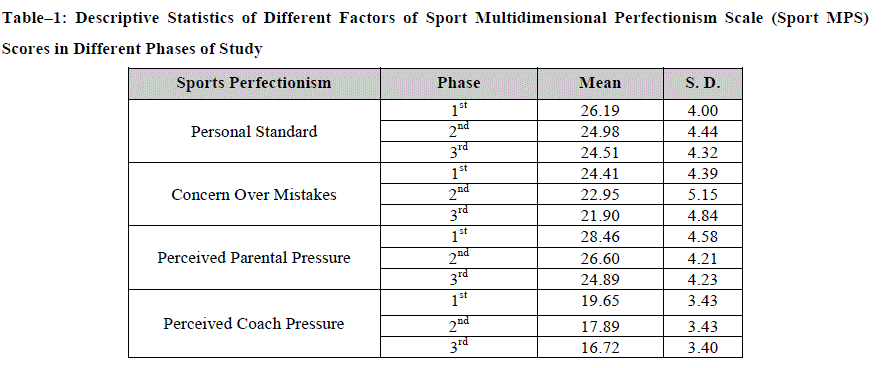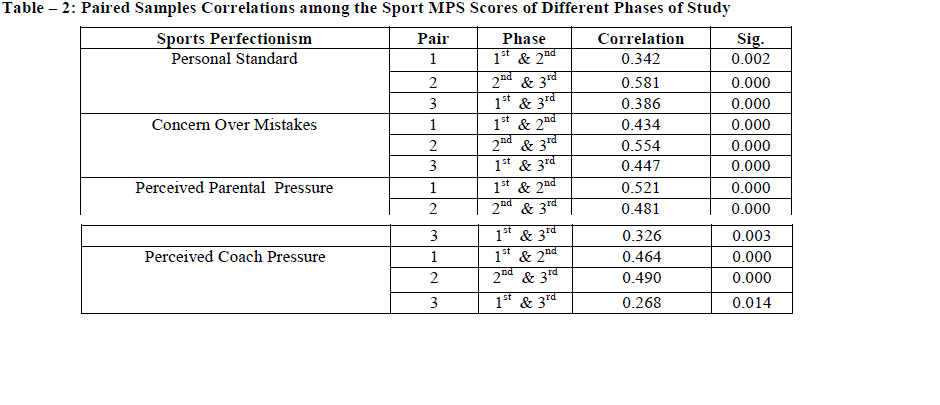ISSN ONLINE(2319-8753)PRINT(2347-6710)
ISSN ONLINE(2319-8753)PRINT(2347-6710)
Bhaskar Chakraborty * and Samirranjan Adhikari **
|
| Related article at Pubmed, Scholar Google |
Visit for more related articles at International Journal of Innovative Research in Science, Engineering and Technology
Objective: Perfectionism is traditionally viewed as an enduring personality trait (Hewitt & Flett, 1991). Theorists concur that the setting of high performance standards is a central feature of the construct. These standards can be evaluated according to intrapersonal and interpersonal-criteria. In the present study, we put an attempt to the management of sports perfectionism of the prospective teachers‟ in physical education. Method: This was longitudinal in nature, carried out quasi experimental research design. 83 B. P.Ed students were chosen as a subject. Sports Multidimensional Perfectionism Scale (Sport MPS) - Dunn, Causgrove Dunn & Syrotuik, 2002 was administered on the subject in three different phases during the academic season 2009- 2010. Result : It is observed that the means of the 1st Factor, 2nd Factor, 3rd Factor and 4th Factor of Sports Perfectionism scores of the B.P.Ed. students decreased significantly as the course advanced towards the completion. Conclusion: Perfectionism is a personality trait and the change in personality trait is very difficult. Hence, we may conclude that the B.P.Ed. course had a positive impact on management of sports perfectionism
Keywords |
| Sports Perfectionism, Quasi – experimental research design |
INTRODUCTION |
| According to Flett and Hewitt [1] perfectionism is a personality trait characterized by striving for flawlessness and setting excessively high standards for performance, accompanied by tendencies towards overly critical evaluations of oneâÃâ¬ÃŸs behaviour. In sports, some researchers see perfectionism as an adaptive trait that helps to achieve elite performance [2]. Other researchers, however, see perfectionism as a maladaptive trait that hinders, rather than helps athletic performance [3]. Chang [4], Enns and Cox [5] have put their opinion that perfectionism is multidimensional and multifaceted, and only some dimensions and facets are clearly negative, harmful and maladaptive, while others may be positive, benign and adaptive. Moreover, research has suggested that two major dimensions of perfectionism be differentiated [6] – (a) a dimension which has been described as positive, healthy, or adaptive perfectionism, and (b) a dimension which has been described as neurotic, unhealthy, or maladaptive perfectionism [7]; [8]; [9] |
Perfectionism and Sports Perfectionism |
| Research on perfectionism has increased exponentially over the past two decades. This increased attention has led to an enhanced understanding of the perfectionism construct. It is now accepted generally that perfectionism is multidimensional, and it is important, both conceptually and empirically, to distinguish the various dimensions of the construct. This multidimensional approach began with the initial work in the laboratory [10] and in the laboratory of Frost and his associates [11]. The Frost et al. (1990) [11] Multidimensional Perfectionism Scale (FMPS) assesses six dimensions, including personal standards, organization (i.e., needing to maintain a sense of order), concern over mistakes, doubts about actions, parental expectations, and parental criticism. |
Role of Perfectionism in Sports and Exercise |
| Research and theory on the role of perfectionism in sports and exercise is important in its own right. But it is also evident that research in this area has important implications for the adaptiveness maladaptiveness issue. Perfectionism is primarily a negative factor that contributes to maladaptive outcomes among athletes and exercisers. However, it is clear that this issue is complex because it cannot be denied that many sports require error-free performance in order for athletes to be successful. A perfectionism paradox exists. There are many sports in which absolute perfection is required; again, negative, self-defeating outcomes and unhealthy patterns of behaviour are evident among those athletes who are characterized by an extreme, perfectionistic personality and who are focused cognitively on attaining perfection. |
1.1 Objectives |
| Physical education takes a crucial role in general education. However, a few numbers of studies are there to probe into the impact of physical education on various psychological and moral developments. Again, there is much theoretical speculation and empirical research about the effect of physical education on somatic and mental development; but the impact of physical education on management of Sports MPS has yet to be probe into. So, the present study is launched the impact of physical education on management of sports MPS. |
II. METHOD |
| The present study was longitudinal in nature. It was carried out through quasi experimental research design. Details regarding sample, tools, procedure of data collection and statistical technique are reported here under. |
A. Sample |
| The participants were 83 graduate and postgraduate students enrolled in physical education teachers training programme (B.P.Ed. course) at three reputed institutions of our country. |
B. Tool |
| The following research tool was used in the present study for collecting data. The tool was selected by applying yardsticks of relevance, appropriateness, reliability, validity and suitability. Brief description of the tool is given hereunder. |
i. Sport Multidimensional Perfectionism Scale (Sport MPS) – |
| This scale was developed by Dunn, Causgrove Dunn & Syrotuik, [12] .The Sport-MPS contains 30 items and 4 subscales. The subscales are labelled Personal Standards (PS: 7 items), Concern Over Mistakes (COM: 8 items, Perceived Parental Pressure (PPP: 9 items), and Perceived Coach Pressure (PCP: 6 items,). The instrument is designed to measure how athletes view certain aspects of their competitive experiences in sport. Athletes rate the extent to which they agree with each of the 30 items using a 5-point Likert-type scale (1 = strongly disagree; 5 =strongly agree). Item scores are averaged within each subscale, with higher scores reflecting higher levels of perfectionism on each dimension. |
C. Procedure of Data Collection – |
| Sport Multidimensional Perfectionism Scale (Sport MPS) was administered in three different phases during an academic season. |
| In the first phase, the test was administered at the beginning of the B.P.Ed. course (in the 1st week of July); In the second phase the same test was administered in the middle of the course; and In the final phase, the same test was administered at the completion of the course (i.e. before study leave). The responses were scored as per scoring procedure prescribed in the manual. |
D. Statistical Analysis - |
| Paired Samples “t”-test was done with the help of SPSS 13.0 software. |
III. RESULT |
| Results Relating to Management of Sports Perfectionism furnished in the following tables. |
 |
| Taking the total (both male and female) students as a whole calculation for “Paired-Samples T Test” was done. From Table –1. It is observed that in Personal Standard (PS) of Sports Perfectionism Scores the means of scores of 1st, 2nd and 3rd phase of testing were 26.19, 24.98 and 24.51 respectively. In Concern over Mistake (COM) of Sports Perfectionism Scores these were 24.41, 22.95 and 21.90 respectively. In Perceived Parental Pressure (PPP) of Sports Perfectionism Scores the means were 28.46, 26.60 and 24.89. In Perceived Coach Pressure (PCP) of Sports Perfectionism Scores the means were 19.65, 17.89 and 16.72. |
 |
| From Table – 2: it is observed that the coefficients of correlations between the Sports Perfectionism Scores in the1st Factor 1st & 2nd phase of testing was 0.342, between the 2nd & 3rd phase of testing was 0.581 and between the 1st & 3rd phase of testing was 0.386. It is observed that the coefficients of correlations between the Sports Perfectionism Scores in the 2nd Factor 1st & 2nd phase of testing was 0.434, between the 2nd & 3rd phase of testing was 0.554 and between the 1st & 3rd phase of testing was 0.447. It is also observed that the coefficients of correlations between the Sports Perfectionism Scores in the 3rd Factor 1st & 2nd phase of testing was 0.521, between the 2nd & 3rd phase of testing was 0.481 and between the 1st & 3rd phase of testing was 0.326. It is also observed that the coefficients of correlations between the Sports Perfectionism Scores in the 4th Factor 1st & 2nd phase of testing was 0.464, between the 2nd & 3rd phase of testing was 0.490 and between the 1st & 3rd phase of testing was 0.268. All correlations were highly (statistically) significant. |
IV. DISCUSSION AND CONCLUSION |
| The Sport-MPS contains 30 items and four subscales. The subscales are labelled Personal Standards, Concern Over Mistakes, Perceived Parental Pressure and Perceived Coach Pressure. The instrument is designed to measure how athletes view certain aspects of their competitive experiences in sport. Athletes rate the extent to which they agree with each of the 30 items using a 5-point Likert-type scale (1 = strongly disagree; 5 =strongly agree). |
| a) The subscale labelled as Personal Standards contains 7 items. The maximum score is (7×5=) 35 and minimum score (7×1=) 7. The means of the scores of the respondents were 26.19, 24.98 and 24.51 respectively in the first, second and third phases of testing. All of the means were above ambivalence (7×3=) 21. The higher personal standard („I have extremely high goals for myself in my sportâÃâ¬ÃŸ) may cause achievement anxiety. As the B.P.Ed. course advanced to the completion the scores on this subscale decreased to a value near ambivalence. This may be due to the decrease of achievement anxiety. Personal standard perhaps took the shape of optimal achievement anxiety level. This may be the impact of the course. |
| b) Concern Over Mistakes contains 8 items. The maximum score is (8×5=) 40 and minimum score (8×1=) 8. The means of the scores of the respondents were 24.41, 22.95 and 21.90 respectively in the first, second and third phases of testing. All of the means were near ambivalence (8×3=) 24. The respondents were not so concern over mistakes (e.g. „If I play well but only make one obvious mistake in the entire game, I still feel disappointed with my performanceâÃâ¬ÃŸ). Over conscious in this subscale make more anxious. The significant decrease of means of scores in this subscale may be the impact of anxiety management of the course. |
| c) Perceived Parental Pressure contains 9 items. The maximum score is (9×5=) 45 and minimum score (9×1=) 9. The means of the scores of the respondents were 28.46, 26.60 and 24.89 respectively in the first, second and third phases of testing. All of the means were near ambivalence (9×3=) 27. The respondentsâÃâ¬ÃŸ Perceived Parental Pressure (e.g. „In competition, I never feel like I can quite meet my parentsâÃâ¬ÃŸ expectationsâÃâ¬ÃŸ) were not so high. This pressure makes one more anxious. The significant decrease of means of scores in this subscale may be the impact of anxiety management of the course. |
| d) Perceived Coach Pressure contains 6 items. The maximum score is (6×5=) 30 and minimum score (6×1=) 6. The means of the scores of the respondents were 19.65, 17.89 and 16.72 respectively in the first, second and third phases of testing. All of the means were near and below the ambivalence (6×3=) 18. The respondentsâÃâ¬ÃŸ Perceived Coach Pressure (e.g. „Only outstanding performance in competition is good enough for my coachâÃâ¬ÃŸ) were not so high. Feeling pressure is feeling anxiety. The significant decrease of means of scores in this subscale may be the impact of anxiety management of the course. The students used to take their coaches (i.e., the physical education teacher educators) were probably not pressure creators, but encouragers. This may be reflected though the results. |
| Perfectionism is a personality trait and the change in personality trait is very difficult. But it was observed that the mean of the 1st, 2nd, 3rd and 4th Factors of the Sports Perfectionism scores of the students of the B.P.Ed. course decreased significantly as the course advanced towards the completion. Hence, we may conclude that the B.P.Ed. course had a positive impact on management of sports perfectionism. Again, perfectionism determines proneness of anxiety. So, we may conclude again that the course actually decreases perfectionism and in turn manages anxiety. |
References |
|